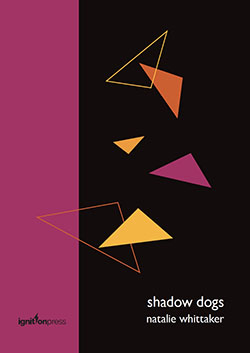Natalie Whittaker’s Shadow Dogs (ignition press) introduces a powerful, controlled new voice.
The twenty-one poems collected here are often short and restrained but, to steal from the pamphlet’s title, the elegant sentences and striking images cast enormous shadows, conjuring something much bigger than themselves. Because of the care with language and the sense of a lived life in these poems, they have long after-lives, resonating after they have been read.
Whittaker is very good on darkness. ‘Not Again’ is one of a number of effective sonnet-length poems in the collection, and conjures a grim domestic scene:
When I came home that night you were raving
to the shipping forecast in the kitchen,
moving with the grace of a broken puppet…
The use of direct address here creates a sense that we are eavesdropping on an intimate moment and, because the focus is on troubled people and a troubled relationship, the drama of the situation is heightened. Whittaker is skilled at setting such glimpses in a wider geographical context, which heightens the reality of the moment and increases its emotional weight. When the second person in this poem ‘screamed at the night’, we are told, ‘The whole city screamed / back; echoes smacking around cars and lamp posts.’ The effect here is something like a movie shot, which focuses intensely on two people before zooming out to give us the whole city. This poem is among a number in the collection with an understated ending that is a non-resolution, allowing this noirish vignette to live long. Just when the reader might yearn for closure, we get instead a shift into a future:
I knew
in the morning the sparrows would drop eggshells
like our thoughts all snappish and empty,
and somewhere a fox was gargling acid
and fishponds reflected the obvious stars.
‘Guy’s Hospital, October 2015’ is another poem that sets up a desperate scene:
In the waiting room a game show called The Edge
combines bowling skills with general knowledge.
Nobody watches or changes the channel.
I carry a chewed polystyrene cup
to the ward that’s wired with orange poison.
There is again, in this poem, a sense of great drama, given to the reader by carefully chosen details. Whittaker’s sense of line and stanza is artful throughout the pamphlet. When referring to someone visiting a patient, we are told ‘Her husband // loiters’; that stanza break somehow enacts the awkwardness of visiting time at hospitals. Direct address is again used effectively and the news that ‘Your fingernails / are gone’, stretched eye-catchingly as it is across a line break, conveys so much suffering. As with ‘Not Again’, the poem’s final sentence shifts the focus, refusing resolution of this troubling scene. Again, we see the effective shift from the intense moment to the wider perspective: ‘Outside the window, sunlight streams / through The Shard and London Bridge Station.’
One of my favourite poems in the collection is ‘Fenced’, which is great at giving us a sense of place, and a life lived:
The smell of next door’s dog shit slinks
through football-smashed fence panels,
stubborn as South London self-esteem; no
one likes us, we don’t care.
The ending, particularly, evokes the way that place and class can define our horizons:
Bluebottles thread the humming blades of grass,
and looking up through sunlight’s needles
I wonder how much height of sky we own.
Throughout Shadow Dogs, Whittaker shows she is adept at sonnet-length poems, but some pieces in the pamphlet are even shorter. Here is the entirety of ‘Question One’:
We spent Monday nights drinking in The Railway,
our team name tattooed through beer-soaked clue sheets.
When asked about you, I never knew the answer.
But there is that photo of us, laughing on that broken-glass
park bench in Barcelona: everyone else dressed for cold
while we’re in sunglasses; winning for ten sparkling minutes.
This poem leaves us feeling privileged to have glimpsed this relationship. Because so much is unexplained and there is so much to piece together, we cannot read passively, and the poem stays with us. We are asked to create the relationship through the contrast between the world of the last image and the world of the opening’s ‘beer-soaked clue sheets’.
The one thing that Shadow Dogs leaves you wanting is to see Whittaker letting herself go across a longer poem or sequence, but the fact that this pamphlet whets the appetite for what might be done across a full collection means that it achieves exactly what a pamphlet should. The slightly more sustained piece ‘Moss’ gives us a hint of this, with its surreal narrative of a speaker who has fallen ‘under the influence / of moss’:
I imagined the countryside, where moss
would bloom over wells, stone bridges and troughs;
a place where I could let the moss
moss over me. Instead, I slept in the shower;
curled around the plughole in a damp bikini,
fingering clumps of pubic hair.
For all the images of decay here, for all of the powerfully controlled darkness throughout Shadow Dogs, the pamphlet leaves us with a sense that this is a writer with a very bright future. While the poems have something in common with the work of Catherine Smith and the early writing of Carol Ann Duffy, and the open endings seem to draw on the poems of Charles Simic, the voice is very much Whittaker’s own.
 You can find out more about Shadow Dogs from ignition press.
You can find out more about Shadow Dogs from ignition press.
If you’d like to review for us or submit your publication for review, please contact Ali Lewis on [email protected] or Will Barrett on [email protected]
Add your Reply
You must be logged in to post a comment.